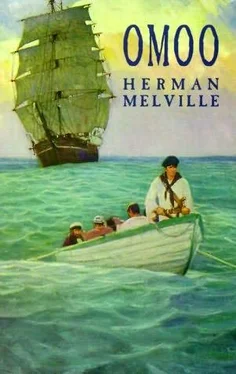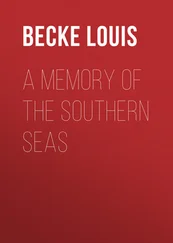Herman Melville - Omoo - Adventures in the South Seas
Здесь есть возможность читать онлайн «Herman Melville - Omoo - Adventures in the South Seas» весь текст электронной книги совершенно бесплатно (целиком полную версию без сокращений). В некоторых случаях можно слушать аудио, скачать через торрент в формате fb2 и присутствует краткое содержание. Жанр: Классическая проза, на английском языке. Описание произведения, (предисловие) а так же отзывы посетителей доступны на портале библиотеки ЛибКат.
- Название:Omoo: Adventures in the South Seas
- Автор:
- Жанр:
- Год:неизвестен
- ISBN:нет данных
- Рейтинг книги:3 / 5. Голосов: 1
-
Избранное:Добавить в избранное
- Отзывы:
-
Ваша оценка:
- 60
- 1
- 2
- 3
- 4
- 5
Omoo: Adventures in the South Seas: краткое содержание, описание и аннотация
Предлагаем к чтению аннотацию, описание, краткое содержание или предисловие (зависит от того, что написал сам автор книги «Omoo: Adventures in the South Seas»). Если вы не нашли необходимую информацию о книге — напишите в комментариях, мы постараемся отыскать её.
Omoo: Adventures in the South Seas — читать онлайн бесплатно полную книгу (весь текст) целиком
Ниже представлен текст книги, разбитый по страницам. Система сохранения места последней прочитанной страницы, позволяет с удобством читать онлайн бесплатно книгу «Omoo: Adventures in the South Seas», без необходимости каждый раз заново искать на чём Вы остановились. Поставьте закладку, и сможете в любой момент перейти на страницу, на которой закончили чтение.
Интервал:
Закладка:
Such, then, is the testimony of good and unbiassed men, who have been upon the spot; but, how comes it to differ so widely from impressions of others at home? Simply thus: instead of estimating the result of missionary labours by the number of heathens who have actually been made to understand and practise (in some measure at least) the precepts of Christianity, this result has been unwarrantably inferred from the number of those who, without any understanding of these things, have in any way been induced to abandon idolatry and conform to certain outward observances.
By authority of some kind or other, exerted upon the natives through their chiefs, and prompted by the hope of some worldly benefit to the latter, and not by appeals to the reason, have conversions in Polynesia been in most cases brought about.
Even in one or two instances-so often held up as wonderful examples of divine power-where the natives have impulsively burned their idols, and rushed to the waters of baptism, the very suddenness of the change has but indicated its unsoundness. Williams, the martyr of Erromanga, relates an instance where the inhabitants of an island professing Christianity voluntarily assembled, and solemnly revived all their heathen customs.
All the world over, facts are more eloquent than words; the following will show in what estimation the missionaries themselves hold the present state of Christianity and morals among the converted Polynesians.
On the island of Imeeo (attached to the Tahitian mission) is a seminary under the charge of the Rev. Mr. Simpson and wife, for the education of the children of the missionaries, exclusively. Sent home-in many cases, at a very early age-to finish their education, the pupils here are taught nothing but the rudiments of knowledge; nothing more than may be learned in the native schools. Notwithstanding this, the two races are kept as far as possible from associating; the avowed reason being to preserve the young whites from moral contamination. The better to insure this end, every effort is made to prevent them from acquiring the native language.
They went even further at the Sandwich Islands; where, a few years ago, a playground for the children of the missionaries was inclosed with a fence many feet high, the more effectually to exclude the wicked little Hawaiians.
And yet, strange as it may seem, the depravity among the Polynesians, which renders precautions like these necessary, was in a measure unknown before their intercourse with the whites. The excellent Captain Wilson, who took the first missionaries out to Tahiti, affirms that the people of that island had, in many things, "more refined ideas of decency than ourselves." Vancouver, also, has some noteworthy ideas on this subject, respecting the Sandwich Islanders.
That the immorality alluded to is continually increasing is plainly shown in the numerous, severe, and perpetually violated laws against licentiousness of all kinds in both groups of islands.
It is hardly to be expected that the missionaries would send home accounts of this state of things. Hence, Captain Beechy, in alluding to the "Polynesian Researches" of Ellis, says that the author has impressed his readers with a far more elevated idea of the moral condition of the Tahitians, and the degree of civilization to which they have attained, than they deserve; or, at least, than the facts which came under his observation authorized. He then goes on to say that, in his intercourse with the islanders, "they had no fear of him, and consequently acted from the impulse of their natural feeling; so that he was the better enabled to obtain a correct knowledge of their real disposition and habits."
Prom my own familiar intercourse with the natives, this last reflection still more forcibly applies to myself.
CHAPTER XLIX
SAME SUBJECT CONTINUED
WE have glanced at their moral and religious condition; let us see how it is with them socially, and in other respects.
It has been said that the only way to civilize a people is to form in them habits of industry. Judged by this principle, the Tahitians are less civilized now than formerly. True, their constitutional indolence is excessive; but surely, if the spirit of Christianity is among them, so unchristian a vice ought to be, at least, partially remedied. But the reverse is the fact. Instead of acquiring new occupations, old ones have been discontinued.
As previously remarked, the manufacture of tappa is nearly obsolete in many parts of the island. So, too, with that of the native tools and domestic utensils; very few of which are now fabricated, since the superiority of European wares has been made so evident.
This, however, would be all very well were the natives to apply themselves to such occupations as would enable them to supply the few articles they need. But they are far from doing so; and the majority being unable to obtain European substitutes for many things before made by themselves, the inevitable consequence is seen in the present wretched and destitute mode of life among the common people. To me so recently from a primitive valley of the Marquesas, the aspect of most of the dwellings of the poorer Tahitians, and their general habits, seemed anything but tidy; nor could I avoid a comparison, immeasurably to the disadvantage of these partially civilized islanders.
In Tahiti, the people have nothing to do; and idleness, everywhere, is the parent of vice. "There is scarcely anything," says the good old Quaker Wheeler, "so striking, or pitiable, as their aimless, nerveless mode of spending life."
Attempts have repeatedly been made to rouse them from their sluggishness; but in vain. Several years ago, the cultivation of cotton was introduced; and, with their usual love of novelty, they went to work with great alacrity; but the interest excited quickly subsided, and now, not a pound of the article is raised.
About the same time, machinery for weaving was sent out from London; and a factory was started at Afrehitoo, in Imeeo. The whiz of the wheels and spindles brought in volunteers from all quarters, who deemed it a privilege to be admitted to work: yet, in six months, not a boy could be hired; and the machinery was knocked down, and packed off to Sydney.
It was the same way with the cultivation of the sugar-cane, a plant indigenous to the island; peculiarly fitted to the soil and climate, and of so excellent a quality that Bligh took slips of it to the West Indies. All the plantations went on famously for a while; the natives swarming in the fields like ants, and making a prodigious stir. What few plantations now remain are owned and worked by whites; who would rather pay a drunken sailor eighteen or twenty Spanish dollars a month, than hire a sober native for his "fish and tarro."
It is well worthy remark here, that every evidence of civilization among the South Sea Islands directly pertains to foreigners; though the fact of such evidence existing at all is usually urged as a proof of the elevated condition of the natives. Thus, at Honolulu, the capital of the Sandwich Islands, there are fine dwelling-houses, several hotels, and barber-shops, ay, even billiard-rooms; but all these are owned and used, be it observed, by whites. There are tailors, and blacksmiths, and carpenters also; but not one of them is a native.
The fact is, that the mechanical and agricultural employment of civilized life require a kind of exertion altogether too steady and sustained to agree with an indolent people like the Polynesians. Calculated for a state of nature, in a climate providentially adapted to it, they are unfit for any other. Nay, as a race, they cannot otherwise long exist.
The following statement speaks for itself.
About the year 1777, Captain Cook estimated the population of Tahiti at about two hundred thousand. By a regular census, taken some four or five years ago, it was found to be only nine thousand. This amazing decrease not only shows the malignancy of the evils necessary to produce it; but, from the fact, the inference unavoidably follows that all the wars, child murders, and other depopulating causes, alleged to have existed in former times, were nothing in comparison to them.
Читать дальшеИнтервал:
Закладка:
Похожие книги на «Omoo: Adventures in the South Seas»
Представляем Вашему вниманию похожие книги на «Omoo: Adventures in the South Seas» списком для выбора. Мы отобрали схожую по названию и смыслу литературу в надежде предоставить читателям больше вариантов отыскать новые, интересные, ещё непрочитанные произведения.
Обсуждение, отзывы о книге «Omoo: Adventures in the South Seas» и просто собственные мнения читателей. Оставьте ваши комментарии, напишите, что Вы думаете о произведении, его смысле или главных героях. Укажите что конкретно понравилось, а что нет, и почему Вы так считаете.












